4 May
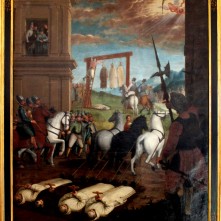
Carthusian Martyrs
1513 – Execution of Edmund de la Pole, 8th Earl of Suffolk and claimant to the English throne. He was executed after his brother, Richard de la Pole, claimed the throne of England in his own right and was recognised as king by Louis XII of France. Edmund and Richard were sons of John de la Pole, 2nd Duke of Suffolk, and his wife, Elizabeth Plantagenet, sister of Edward IV.
1535 – Executions of three Carthusian monks and a Bridgettine monk at Tyburn for rejecting the royal supremacy. Click here to read more about them.
1536 – Arrests of Sir Francis Weston and Sir William Brereton during the fall of Anne Boleyn. They were both taken to the Tower of London. Click here to read more.
1608 – Funeral of Elizabeth Talbot (Bess of Hardwick), Countess of Shrewsbury, in All Hallows, Derby. At the time of her death, she was one of the richest people in England.
5 May
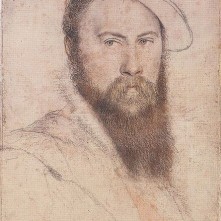
Thomas Wyatt
1536 – By the 5th May, the final arrests (Sir Thomas Wyatt and Richard Page) had been made in the fall of Anne Boleyn.
1542 – Birth of Thomas Cecil, 1st Earl of Exeter, courtier and soldier, and the eldest son of William Cecil, 1st Baron Burghley, by his first wife Mary Cheke.
1542 - Agnes Tilney, Dowager Duchess of Norfolk, was pardoned after spending nearly five months imprisoned in the Tower of London. Her home and valuables had been seized but she had kept her head, unlike her step-granddaughter, Catherine Howard.
1543 – Execution of George Bucker (aka Adam Damplip), religious radical. He was hanged, drawn and quartered in Calais for treason.
1586 – Death of Sir Henry Sidney, courtier and Lord Deputy of Ireland. His body was buried in the Sidney Chapel at Penshurst and his heart in Ludlow, where he lived as President of the Council in the Marches of Wales.
1623 – Death of Philip Rosseter, lutenist, composer and theatre manager.
1625 – Burial of James I (VI of Scotland) in the Henry VII Chapel of Westminster Abbey. He had been King of England for twenty-two years, and was known for uniting the crowns of England and Scotland.
6 May
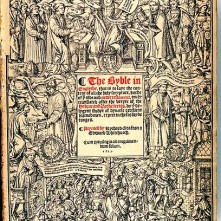
The Great Bible
1502 – Execution of Sir James Tyrell, former royal councillor, for treason after he had spent time with Edmund de la Pole. He is known for a confession which he was alleged to have made after his arrest, confessing to murdering the Princes in the Tower.
1527 – The Sack of Rome. Rome was attacked and looted by mutinous imperial troops. Pope Clement VII managed to escape, but the majority of the Swiss Guard were killed.
1536 - It is said that Anne Boleyn wrote a letter to her husband, King Henry VIII, from the Tower of London. It was headed with the words “To the King from the Lady in the Tower”, alleged to have been written by Thomas Cromwell. It is not known for sure whether Anne definitely wrote it.
1540 – Death of Juan Luis Vives, scholar, at Bruges. Tudor history lovers know him for being a friend and spiritual adviser to Catherine of Aragon and a tutor to Princess Mary. He wrote a treatise, “Education of a Christian Woman”, with Catherine's encouragement, and also wrote Satellitium animi, or “Escort of the Soul”, a plan of study for Mary.
1541 – Henry VIII issued an injunction ordering "the Byble of the largest and greatest volume, to be had in every churche". The Bible referred to was “The Great Bible” or “Coverdale Bible”, the first authorised Bible in English. It had been prepared by Miles Coverdale and was based on the work of William Tyndale.
1563 – Burial of Henry Stafford, 10th Baron Stafford, in Worthen Church near Caus Castle in Shropshire.
7 May

Bishop John Fisher
1536 – Queen Anne Boleyn’s chaplain, William Latymer, was searched by the Mayor and jurates of Sandwich on his arrival back in England. He was returning from a business visit to Flanders, a visit he had undertaken on behalf of the Queen. Latymer had often brought Anne religious books back from the Continent, so it was lucky for him that he did not have anything which could have been deemed as heretical in his luggage. Records were made of the books that he was carrying and of those which he was having sent directly to London, but he was allowed to carry on with his journey.
1540 – Death of Sir William Weston, Prior of the Hospital of St John of Jerusalem in England. He died at the priory on the day that the order to dissolve it was passed through the Commons. He was the uncle of Sir Francis Weston, a man executed in 1536 in the coup against Anne Boleyn.
1547 – Death of John Longland, Bishop of Lincoln, at Wooburn. He had requested that his body be buried at Eton College and his heart in the cathedral church at Lincoln.
1560 – English troops charged the wall of Leith at the siege of Leith. They were unsuccessful and suffered heavy losses.
1567 – Divorce of James Hepburn, 4th Earl of Bothwell, and Jean Gordon. The grounds for divorce were her alleged adultery with her servant, but Bothwell married Mary, Queen of Scots, just eight days later.
1592 – Death of Sir Christopher Wray, judge, Chief Justice of the King's Bench and Speaker of the House of Commons. He was buried at St Michael's Church, Glentworth, Lincolnshire.
1594 – Death of Edmund Scambler, Bishop of Peterborough and Norwich, at Norwich. He was buried in the cathedral, but his tomb was destroyed in the Civil War.
1603 – James VI/I arrived in London after travelling from Edinburgh to claim the English throne. His predecessor, Elizabeth I, had died on 24th March.
8 May
1508 – Birth of Charles Wriothesley, herald and chronicler, in London. His chronicle is one of the major primary sources for Henry VIII's reign. Charles came from a family of heralds; he was the younger son of Sir Thomas Wriothesley, Garter King of Arms, grandson of John Writhe, Garther King of Arms, and nephew of William Wriothesley, York Herald. Charles' offices included Rouge Croix Pursuivant and Windsor Herald of Arms in Ordinary, but he did not go as far as his father and grandfather.
1538 – Death of Edward Fox, Bishop of Hereford and diplomat. He was active in trying to secure the annulment of Henry VIII's marriage to Catherine of Aragon, and produced several books and polemics on Henry's Great Matter, including Henricus octavus.
1539 – The troops mustered between Whitechapel and Mile End marched through the City and Westminster to St James's, where Henry VIII reviewed them. This was in response to the war panic caused by Francis I and Charles V signing the Peace of Toledo.
1546 – Death of Thomas Knollys, President of Magdalen College, University of Oxford, from 1528 to 1536. In 1536, Knollys became Vicar of South Kirlby and died there in 1546. He was buried at Wakefield.
1559 – The “Act of Uniformity” was signed by Elizabeth I, and the “Act of Supremacy” was given royal assent. The monarch was Head of the Church again, and still is today.
9 May
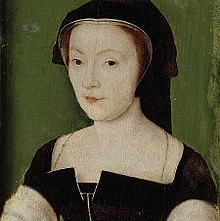
Marie de Guise
1538 – Marie de Guise (Mary of Guise) and James V of Scotland were married by proxy at the Château de Châteaudun, with Robert Maxwell, 5th Lord Maxwell, standing in for James.
1558 – Death of Sir Philip Hoby, diplomat and administrator, at his home in Blackfriars, London. He had risen due to his friendship with Cromwell, and in Edward VI's reign, he was resident ambassador to the Emperor and a Privy Councillor.
1597 – Death of Thomas Hide, religious controversialist and writer of “A Consolatorie Epistle to the Afflicted Catholikes”. He fled into exile in Louvain in Elizabeth I's reign after he was labelled as a man who favoured the old religion. He then moved to Douai, where he died in 1597.
1657 – Death of William Bradford, founder of the Plymouth Colony, in Plymouth. He is also known for “Of Plimmoth Plantation”, his chronicle of the founding of the colony and its early years.
10 May
1509 – Birth of Edward Stanley, 3rd Earl of Derby and Privy Councillor to Mary I and Elizabeth I. He was born in Lancashire and was the eldest surviving son of Thomas Stanley, 2nd Earl of Derby, and his wife, Anne Hastings.
1533 – Opening of special court at Dunstable by Archbishop Cranmer to rule on the validity of the marriage of Henry VIII and Catherine of Aragon. On 23rd May, Cranmer’s court ruled that the marriage between Henry VIII and Catherine of Aragon was against the will of God, and declared that the marriage was null and void.
1536 - Giles Heron, foreman of the Grand Jury of Middlesex and son-in-law of the late Sir Thomas More, announced that the jury had decided that there was sufficient evidence to suggest that Anne Boleyn, George Boleyn, Mark Smeaton, Sir Henry Norris, Sir Francis Weston and Sir William Brereton were guilty of the alleged crimes carried out at Hampton Court Palace and Whitehall, and that they should be indicted and sent to trial before a jury.
1536 - Sir William Kingston, the Constable of the Tower of London, was ordered “to bring up the bodies of Sir Francis Weston, knt. Henry Noreys, esq.William Bryerton, esq. and Mark Smeton, gent. at Westminster, on Friday next after three weeks of Easter”, i.e. on 12th May. This would be the day of their trial.
1552 – Suicide of John Clerk, author and secretary to Thomas Howard, 3rd Duke of Norfolk, in the Tower of London. Clerk hanged himself with his girdle after books about necromancy were found in his possession, and he was interrogated regarding “lewd prophecies and slanders”.
1553 – The first expedition of the Company of Merchant Adventurers (Mystery and Company of Merchant Adventurers for the Discovery of Regions, Dominions, Islands, and Places unknown), led by Sir Hugh Willoughby, left London in search of a Northeast passage for Asia.
1554 – Death of Thomas Goodrich, Bishop of Ely and Lord Chancellor during the reign of Edward VI. He died at the palace of Somersham, Huntingdonshire, and was buried in Ely Cathedral. His tomb brass shows him in Protestant episcopal dress and with the Bible and Great Seal in his hands.


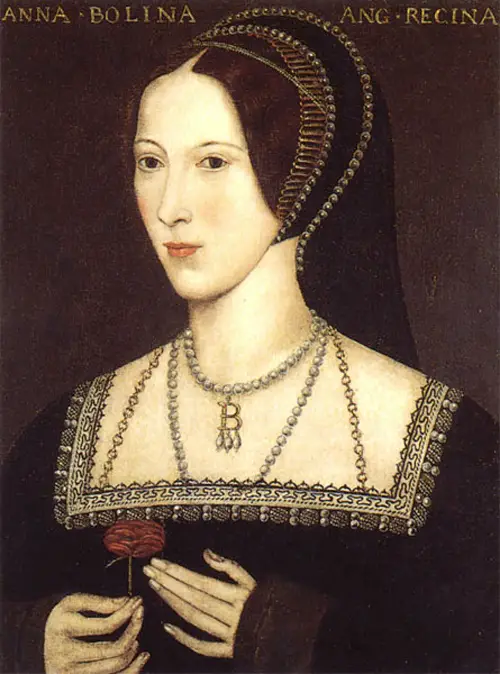
Leave a Reply